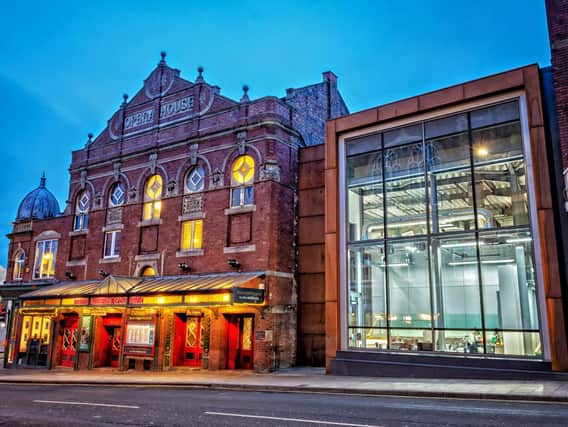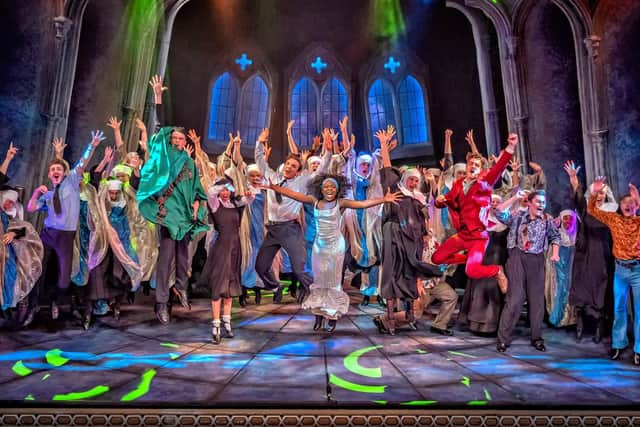Why Theatre Royal Wakefield needs public’s help to make sure the lights go back on


When I started to officially hear from theatres that they would be closing, it was interesting to see how the announcements were made and the wording theatres chose to use.
Some were bullish, with a message that they ‘would be back’. Others were, frankly, a little optimistic with the dates they suggested we would be seeing the inside of their auditoria once again.
Advertisement
Hide AdAdvertisement
Hide AdThere was one announcement that tugged at the heartstrings a little more keenly than others.


Theatre Royal Wakefield made its official announcement via a press release which included the key and quite telling phrase: “At present it is unknown how long this closure will last.”
Still brings a lump to the throat.
Theatre Royal Wakefield is one of those that inspires a particular sentiment: it’s not as big as some of the other theatres in the region, but that seems to make the audiences that do love it, love it all the more.
One of the oldest of our region’s theatres, it was originally opened in 1894 and has over its long history been used variously as a cinema and a bingo hall.
Advertisement
Hide AdAdvertisement
Hide AdThe Frank Matcham building – the smallest surviving Matcham theatre – was taken over by a group of small and dedicated volunteers in the early 1980s, providing the clue as to why it inspires such sentiment.
Led by Sir Rodney Walker, the volunteer group saw it reopen in 1986, as a theatre.
When I presented a radio show there late last year, there was a whole line of volunteers queueing up to tell me of their role at and pride for the theatre.
Katie Town took over as chief executive of the theatre from the long-standing Murray Edwards in 2015.
Advertisement
Hide AdAdvertisement
Hide AdAn impressive leader who trained in law and was called to the bar before a switch in careers to the arts, it is Town who must navigate the choppy waters in which the theatre and the industry suddenly finds itself.
“We are incredibly proud to be Wakefield’s theatre. It has been overwhelming to see the love and support that people have shown us in these challenging times,” says Town.
“Theatre Royal Wakefield is important to the city because we present work that is relevant, but we also provide escapism in the form of a great night out on your doorstep.”
Since taking over, Town has steered the good ship Theatre Royal in a particular direction.
Advertisement
Hide AdAdvertisement
Hide AdThe theatre has always had a very strong youth arm, training stage stars of the future, with an impressive number of graduates going from the stage of the Wakefield theatre to stages of
the West End.
That continues, but Town has also adapted to stay relevant to Wakefield’s newer communities.
She says: “Every week we train more than 200 young people and we work with the local Asylum Seeker and Refugee Communities. Our production of Scary Bikers by John Godber in 2018 was commissioned by Sky Arts as part of ART50, a project which examined who we are in the wake of the referendum vote.
“It went on to have an extended run in London’s West End in 2019, garnered four and five star reviews in the national press and even counted Andrew Lincoln and Stephen Mangan amongst audience members.”
Advertisement
Hide AdAdvertisement
Hide AdGodber, a son of Wakefield, has been a key component of the theatre since he set up shop there in 2011. The John Godber Company has been touring all its work from Wakefield since then.
“Our production of Sister Act in 2019 saw over 50 local young people take to the stage who were rewarded with regular standing ovations,” says Town.
“Our pantomime goes from strength to strength every year and last year broke all box office records with 31,429 people attending.”
So the theatre is important and was thriving. But there is a new reality with which we are all faced.
Advertisement
Hide AdAdvertisement
Hide AdAs a Theatre Royal punter I received an email last week marked as a ‘message from the theatre’s executive director’. In it Town wrote to me, as a customer, that: “These are challenging times for us all. We receive no regular funding from local or national government and fundraise to support our work. With our doors closed this is harder to do.”
Town says: “It’s a very difficult time, but we have a fantastic team who are working incredibly hard behind the scenes to ensure we survive this.
“It’s going to be a long road, but my hope is that with a strong team and the support of our loyal audiences we can come out of this stronger on the other side.”
Town, however optimistic, is also a realist. “All of our income is self-generated. We rely on ticket sales and our front of house sales, so that’s the bars and the cafe, which are obviously not trading at the moment. The current crisis has made an already challenging job even harder.”
Advertisement
Hide AdAdvertisement
Hide AdI want to be neither complacent and say that this theatre was revived in the 1980s and is too loved to be allowed to fall by the wayside, nor do I want to be a doomsayer and warn that Wakefield might lose this theatre, what I will say is that it is too important and loved to just let go.
As Town says: “With the public’s help, the theatre’s lights will go back on.”
The Theatre Royal Wakefield is a charity. It does not receive any regular public funding and relies on the generous support of the public to help continue its life-changing work with, among others, young people from low-income families, socially isolated older people, refugees and asylum seekers.
To support the Theatre Royal Wakefield, you can make a donation. You can donate £5 by texting TRW20 to 70970 or you can go to theatreroyalwakefield.co.uk/support/donate where you can choose your own amount.
Advertisement
Hide AdAdvertisement
Hide AdOr you can send a cheque to: Theatre Royal Wakefield, Drury Lane, Wakefield, WF1 2TE.
Editor’s note: first and foremost - and rarely have I written down these words with more sincerity - I hope this finds you well.
Almost certainly you are here because you value the quality and the integrity of the journalism produced by The Yorkshire Post’s journalists - almost all of which live alongside you in Yorkshire, spending the wages they earn with Yorkshire businesses - who last year took this title to the industry watchdog’s Most Trusted Newspaper in Britain accolade.
And that is why I must make an urgent request of you: as advertising revenue declines, your support becomes evermore crucial to the maintenance of the journalistic standards expected of The Yorkshire Post. If you can, safely, please buy a paper or take up a subscription. We want to continue to make you proud of Yorkshire’s National Newspaper but we are going to need your help.
Advertisement
Hide AdAdvertisement
Hide AdPostal subscription copies can be ordered by calling 0330 4030066 or by emailing [email protected]. Vouchers, to be exchanged at retail sales outlets - our newsagents need you, too - can be subscribed to by contacting subscriptions on 0330 1235950 or by visiting www.localsubsplus.co.uk where you should select The Yorkshire Post from the list of titles available.
If you want to help right now, download our tablet app from the App / Play Stores. Every contribution you make helps to provide this county with the best regional journalism in the country.
Sincerely. Thank you.
James Mitchinson
Editor
